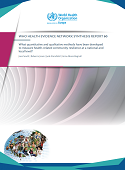What quantitative and qualitative methods have been developed to measure health-related community resilience at a national and local level? (2018)

Download
By: Jane South, Rebecca Jones, Jude Stansfield, Anne-Marie Bagnall
Health Evidence Network synthesis report 60
2018, ix + 48 pages
ISBN 978 92 890 5362 4
CHF 20.00
Order no. 13400199
Community resilience is the ability of communities and groups to adapt and thrive in response to external stressors. Building resilient communities as a strategy for population health requires assessment of personal and collective capacities alongside vulnerabilities. This report examines what quantitative and qualitative methods can be used to measure health-related community resilience at national and local levels. Evidence from a rapid review of 33 studies highlighted various methodological challenges. Measurement strategies, mostly drawn from the field of community disaster resilience, include population-level frameworks, mixed methods assessment tools, and qualitative and participatory case studies.
The main conclusions are that measurement of health-related community resilience should cover multiple domains (economic, social, health, skills, political and environment) and consider local context and assets. Three stages of policy development are suggested: selection of a set of key indicators to collect data on community resilience, creation of a learning network to share knowledge and tools, and development of a comprehensive measurement framework.



